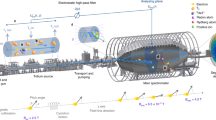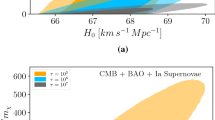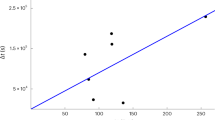Abstract
The conservative hypothesis that the Universe is dominated by nonbaryonic matter made up of particles that have already been observed in the laboratory is not tenable within a standard big-bang cosmology if all neutrino species are stable. It can be salvaged only if one neutrino species has a mass in the range 0.1–250 MeV and decays on a short mass-dependent time scale, while a second species has a mass in the range 10–50 eV and is stable.
This is a preview of subscription content, access via your institution
Access options
Subscribe to this journal
Receive 51 print issues and online access
$199.00 per year
only $3.90 per issue
Buy this article
- Purchase on Springer Link
- Instant access to full article PDF
Prices may be subject to local taxes which are calculated during checkout
Similar content being viewed by others
References
Faber, S. M. & Gallagher, J. S. A. Rev. Astr. Astrophys. 17, 135–187 (1979).
Schramm, D. N. Phil. Trans. R. Soc. A307, 43 (1982).
Lyubimov, V.A., Novikov, E. G., Nozik, V. Z., Tretyakov, E. F. & Kozik, V. S. Phys. Lett. B94, 266–268 (1980).
Reines, F., Sobel, S. W. & Pasierb, E. Phys. Rev. Lett. 45, 1307–1311 (1980).
Weinberg, S. Gravitation and Cosmology (Wiley, New York, 1972).
Bond, J. R., Efstathiou, G. & Silk, J. Phys. Rev. Lett. 45, 1980–1984 (1980).
Bond, J. R. & Szalay, A. S. Astrophys. J. 274, 443–468 (1983).
Peebles, P. J. E. Astrophys. J. 258, 415–424 (1982).
White, S. D. M., Frenk, C. S. & Davis, M. Astrophys. J. Lett. 274, L1–L5 (1983).
Hut, P. Phys. Lett. 69 B, 85–88 (1977).
Lee, B. W. & Weinberg, S. Phys. Rev. Lett. 39, 165–168 (1977).
Sato, K. & Kobayashi, M. Prog. theor. Phys. 58, 1775–1789 (1977)
Vyssotskii, M. I., Dolgov, A. D. & Zel'dovich, Ya. B. JETP Lett. 26, 188–190 (1979).
Peebles, P. J. E. Astrophys. J. Lett. 263, L1–L5 (1982).
Bacino, W. et al. Phys. Rev. Lett. 42, 749–752 (1979).
Falk, S. W. & Schramm, D. N. Phys. Lett. 79 B, 511–513 (1978).
Toussaint, D. & Wilczek, F. Nature 289, 777–778 (1981).
Turner, M. S., Steigman, G. & Krauss, L. M. Preprint, Fermilab-Publ. 84/32-A (1984).
Gelmini, G. & Schramm, D. N. Preprint (University of Chicago, 1984).
Davis, M., Lecar, M., Pryor, C. & Witten, E. Astrophys. J. 250, 423–431 (1981).
Lindley, D. Mon. Not. R. astr. Soc. 188, 15P–19P (1979).
Dicus, D. A., Kolb, E. W. & Teplitz, V. L. Astrophys. J. 221, 327–341 (1978).
Dicus, D. A., Kolb, E. W., Teplitz, V. L. & Wagoner, R. V. Phys. Rev. D17, 1529–1538 (1978).
Gunn, J. E., Lee, B. W., Lerche, I., Schramm, D. N. & Steigman, G. Astrophys. J. 223, 1015–1031 (1978).
Miyama, S. & Sato, K. Prog. theor. Phys. 60, 1703–1716 (1978).
Krauss, L. M. Phys. Lett. 128 B, 37–43 (1983).
Hawking, S. W. Phys. Lett. 115 B, 295–297 (1982).
Guth, A. & Yi Pi, S. Phys. Rev. Lett. 49, 1110–1113 (1982).
Starobinski, A. A. Phys. Lett. 117 B, 175–178 (1982).
Fixsen, D. J., Cheng, F. S. & Wilkinson, D. T. Phys. Rev. Lett. 50, 620–622 (1983).
Bond, J. R., Szalay, A. S. & Turner, M. S. Phys. Rev. Lett. 48, 1636–1639 (1982).
Kimble, R., Bowyer, S. & Jacobsen, P. Phys. Rev. Lett. 46, 80–83 (1981).
Stecker, F. W. & Brown, R. W. Astrophys. J. 257, 1–9 (1982).
Davis, M., Huchra, J., Latham, D. W. & Tonry, J. Astrophys. J. 253, 423–445 (1981).
Danese, L. & De Zotti, G. Astr. Astrophys. 107, 39–42 (1982).
Preskill, J., Wise, M. & Wilczek, F. Phys. Lett. 120 B, 127–132 (1983).
Abbott, L. & Sikivie, P. Phys, Lett. 120 B, 133–136 (1983).
Dine, M. & Fischler, W. Phys. Lett. 120 B, 137–141 (1983).
Fukugita, M., Watamura, S. & Yoshimura, M. Phys. Rev. Lett. 48, 1522–1525 (1982).
Author information
Authors and Affiliations
Rights and permissions
About this article
Cite this article
Hut, P., White, S. Can a neutrino-dominated Universe be rejected?. Nature 310, 637–640 (1984). https://doi.org/10.1038/310637a0
Issue Date:
DOI: https://doi.org/10.1038/310637a0
This article is cited by
-
Constraints on unstable heavy neutrinos from cosmology
Journal of Astrophysics and Astronomy (1986)
-
Possible cosmological scenario with an unstable 17-keV neutrino
Nature (1985)
Comments
By submitting a comment you agree to abide by our Terms and Community Guidelines. If you find something abusive or that does not comply with our terms or guidelines please flag it as inappropriate.



